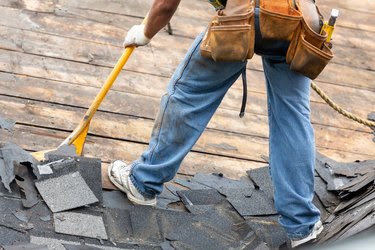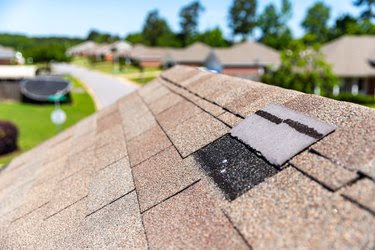Quck answer
1. Research local roofers: Look for reputable roofers in your area by asking for recommendations from friends, family, or neighbors, or by checking online reviews and ratings.
2. Get multiple quotes: Contact several roofers and request quotes for the job. Compare the quotes to ensure you are getting a fair price and to understand what services are included.
3. Check credentials and insurance: Verify that the roofer has the necessary licenses and certifications required by your state or local authorities. Additionally, make sure they have liability and workers’ compensation insurance to protect you from any potential accidents or damages.
4. Review past work: Ask the roofer for references or examples of their previous work. This will give you an idea of their experience and the quality of their workmanship.
5. Written contract: Before hiring a roofer, make sure to have a written contract that clearly outlines the scope of the work, the materials to be used, the timeline, and the payment terms.
6. Communication and customer service: Choose a roofer who is responsive, communicates clearly, and provides excellent customer service. You want to work with someone who is easy to reach and who will address any concerns or questions you may have throughout the project.
By following these steps, you can hire a reliable and skilled roofer who will ensure your roofing project is completed successfully and to your satisfaction.
When it comes to hiring a roofer, it’s never a pleasant experience. Whether you’re dealing with a small roof leak or extensive damage from a storm, fixing a roof is not a do-it-yourself project. Roofers have the necessary expertise, tools, and safety equipment to handle roof repairs and installations. If you’re unsure where to start, this guide will help you find the best roofer for the job and give you an idea of the approximate cost.
Understanding the Role of a Roofing Contractor

Image Credit:
Kevin Trimmer/Moment/GettyImages
A roofing company may be a small operation or a larger company with multiple crews. Their main tasks include repairing or installing new roofs. Some remodeling companies also offer roofing services along with other home improvement projects like siding and window installations.
If you have a roof leak, a roofer can identify the source and determine the necessary materials for the fix. They can also identify potential problem areas while inspecting your roof. However, replacing an entire roof is a more complex process than fixing a leak. The tasks involved in roof replacement include:
- Visiting your home to measure and discuss material options.
- Providing a written estimate that includes details about product and labor warranties.
- Obtaining construction permits if required (note that some areas do not require permits for roof replacements).
- Ordering roofing materials such as asphalt shingles, flashing, drip edge, ice dam underlayment, roofing felt, and nails.
- Arranging for a dumpster to dispose of old roofing materials.
- Hiring a gutter installer if needed (some roofers use subcontractors for gutter installation).
- Removing the existing roof.
- Inspecting and repairing the roof deck.
- Installing the new roof.
- Cleaning up the area and ensuring no loose fasteners or nails are left behind.
If your roof repair or replacement is covered by your homeowners’ insurance, the roofer can assist with the claim filing process. In most cases, you can hire any qualified roofing company, although some insurance companies have a list of preferred contractors.
The requirements may vary among insurance companies, but both you and the roofer should document the damage with photographs before making any repairs. The roofer should provide an estimate for you to submit as part of your claim, and they should be present when the insurance adjuster inspects the damage.
Doing Your Research

Image Credit:
C5Media/iStock/GettyImages
While you may assume that all roofs are the same, there are actually many decisions to make and materials to consider before hiring a roofer.
Types of Roofing Materials
The majority of homes in this country use asphalt shingles as their roofing material. These shingles come in various colors and styles, including flat shingles and architectural shingles. However, there are also other options available such as slate, wood shakes and shingles, tile, and metal. It is important to choose the type of roofing material before contacting a roofer, as not all roofers are experts in installing every type.
If you are interested in a slate or wood shake roof, it is recommended to search for a roofer specializing in those materials. Additionally, it is important to check for any restrictions on roof materials and colors if you are part of a homeowners’ association or live in a historic neighborhood with strict regulations.
Gutters and Downspouts
When replacing a roof, it is common to also install new gutters and downspouts. This requires deciding on the materials and colors beforehand. The most common gutter materials are seamless aluminum and vinyl. Copper and wood gutters are less common but still available. It is important to communicate your preferences to the roofer before finalizing the contract, as most roofers default to using aluminum gutters.
Attic Ventilation
Proper attic ventilation is essential for most roofs. One popular method is a combination of soffit and roof or ridge vents, but there are other options as well. If the roofing estimate or contract does not mention ventilation, it is important to inquire about it. Adequate attic ventilation helps remove excess moisture from the air, preventing damage to the attic’s structure. It also helps keep the roof deck cold in winter, reducing the risk of ice dams in snowy climates.
Choosing Between a Roofing Contractor and Handyman

Image Credit:
Pramote Polyamate/Moment/GettyImages
For simple repairs or small tasks like replacing missing shingles or sealing openings, a handyman can handle the job. However, for a full roof replacement, it is best to hire a professional roofer.
Roofing contractors have extensive experience and knowledge in installing different roofing materials. They understand the proper installation methods and ensure that the courses are straight and the seams do not align, which could cause leaks. They also pay special attention to flashing roof penetrations, as these areas are more prone to leaks.
While a roofing hammer is essential, most roofers use nail guns to increase efficiency and ensure proper nail placement. Roofing companies often have equipment like ladder lifts to transport materials, allowing more crew members to focus on installing the roof rather than carrying materials on ladders.
Furthermore, there is a sense of confidence that arises from ascending and descending ladders and traversing and working on inclined surfaces throughout the day. They are accustomed to the working conditions. Professional roofers prioritize safety and typically possess safety gear, such as safety harnesses, at the worksite.
If your roofing project involves an insurance claim, a skilled roofer can act as an advocate on your behalf and collaborate with the claims adjuster to ensure you receive a fair settlement. If your state mandates that roofers be licensed, the insurance company may decline to reimburse you for damages if the company or individual performing the work lacks the necessary license.
Inquiries to Pose to a Roofing Contractor Before Hiring

Image Credit:
Everyday better to do everything you love/iStock/GettyImages
Replacing an existing roof is a significant financial commitment that most homeowners only go through once, or perhaps twice if they reside in the house for an exceptionally long period. Seek potential candidates for your roofing project by consulting with neighbors and friends regarding their roofing experiences. Other contractors can also serve as reliable sources for recommendations, so if you have previously collaborated with a different type of tradesperson, consider asking for a referral.
Queries to ask prospective candidates include:
- Do you have a license? Requirements for licensing vary depending on the state, and not all areas require roofers to be licensed.
- What insurance do you have? There are three types of insurance. Workers’ compensation covers the roofing crew in case of injury on the job. General liability insurance covers any damage to your home. A surety bond guarantees payment to you if the roofer doesn’t complete the job. Not all roofers are bonded unless it’s required locally.
- Can you provide references? All roofers should be able to give you the names and contact information of past clients.
- Will you give a written estimate? What will it include?
- What is your payment schedule? Most roofers will ask for a deposit when you sign the contract. The amount may be limited by law, but it shouldn’t exceed 10 to 25 percent of the total estimate. Don’t pay in full before the job starts and don’t make your final payment until you’re satisfied with the work.
- What kind of warranty do you offer? There will be a warranty on the materials as well as a workmanship warranty. The materials warranty can last 20 to 50 years or more depending on the project. Workmanship warranties range from 5 to 25 years. In some cases, the two warranties are combined into one lifetime warranty. In such cases, the contractor will be certified by the materials manufacturer, and the contractor will use products specified by the manufacturer.
- What are the start and end dates? Roofing projects can be delayed due to weather conditions.
The Cost of Hiring a Roofing Contractor

Image Credit:
Ratchat/iStock/GettyImages
The cost of a roofing job depends on the materials chosen and the complexity of the project. Certain materials are significantly more expensive than others, and there are variations within specific types of materials. For instance, thick architectural asphalt shingles provide visual appeal and have a longer lifespan compared to thin, three-tab products. However, they also cost two to three times more. The cost increases for roofs with steep angles and multiple angles. Generally, labor charges make up 40 to 60 percent of the project cost.
Roofers measure the area of a roof in squares, where one square equals 100 square feet. The approximate installed cost per square for popular roofing materials is as follows:
- Asphalt shingles: $300 to $800
- Wood shakes and shingles: $600 to $1,400
- Metal: $700 to $1,600
- Clay or concrete tiles: $1,000 to $2,400
- Slate: $900 to $2,500
Roofing Contractor Licensing and Certification
Some states require roofers to have a license. Obtaining a license usually involves providing proof of insurance. In certain cases, roofers may need to pass an exam before obtaining the license. In some areas, while a license may not be necessary for roofing work, roofers still need to register their business with the state. To learn about the regulations in your state, check with the state’s licensing board or office of consumer affairs.
Several roofing material manufacturers provide training programs for roofers. The roofer obtains certification in the installation of the products offered by that particular company. Additionally, the manufacturer may ask for proof of insurance and a satisfactory track record with the Better Business Bureau. Roofers who are certified by a manufacturer are able to provide the most comprehensive warranties available from the company. Recertification is typically required for most certification programs at regular intervals.


